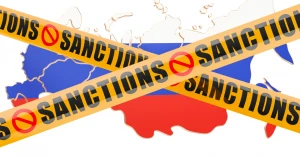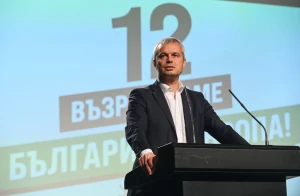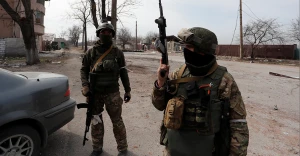
How Soviet teachers turned today's Russians into murderers
Russia's informational and then armed aggression against Ukraine became possible not least because of the systemic, deliberate or unintentional, marginalization of the teaching profession
Earlier this week, Volodymyr Viatrovych, an MP and well-known historian and popularizer of history, wrote on his Facebook page: “Today, the parliament adopted in the first reading the bill 9046, which is designed to solve two important tasks in the field of school education. First, to return to school a full-fledged state final examination. Secondly, to make it compulsory for all students to take the state final examination not only in math and Ukrainian, but also in a foreign language and the history of Ukraine. If the draft law is adopted in its entirety, the full-fledged state final examination will be restored in schools as early as 2024, and the exam on the history of Ukraine will be an integral part of it.”
Speaking about the importance of school education for strengthening the state, Mr. Viatrovych repeatedly quoted Professor Oscar Peschel of Leipzig: “When the Prussians defeated the Austrians, it was a victory of the Prussian school teacher over the Austrian one.” In the interpretation of Chancellor Otto von Bismarck, the phrase sounds like this: “The war is won by school teachers and parish priests.” Simply put, the way and what children and flocks were taught, they will have such values. This means that they will fight for them if necessary.
“In the interpretation of Chancellor Otto von Bismarck, the phrase sounds like this: “The war is won by school teachers and parish priests.” Simply put, the way and what children and flocks were taught, they will have such values. This means that they will fight for them if necessary.”
They will fight only if their government sends them to war. They will start military aggression and aggressive invasion of another country's territory. Although the invasion may not be overtly aggressive. Soft power, a gradual and consistent seizure of someone else's information and cultural space is enough. In other circumstances, teachers and priests teach not to attack, but to defend, to protect their own values.
Active, conscious Ukrainians with a strong civic position have been resisting Russian aggression on all fronts for nine years. Russia's informational and then armed aggression against Ukraine became possible not least because of the systematic, deliberate or unintentional, marginalization of the teaching profession. It's not just the low salaries that have resulted in almost entirely male teachers leaving the profession. Although in the countries that Ukraine wants to be equal to, a male schoolteacher is not exotic, but the norm. It's also about the systematic humiliation that teachers have suffered and are still suffering.
“Russia's information and then armed aggression against Ukraine became possible not least because of the systemic, deliberate or unintentional, marginalization of the teaching profession. It's not just the low salaries that have led to the almost complete exodus of men from the profession. Although in the countries that Ukraine wants to be equal to, a male schoolteacher is not exotic, but the norm. It's also about the systematic humiliation that teachers have suffered and are still suffering.”
Remember who socially active citizens treated with undisguised contempt when, during Yanukovych's presidency, they were talking about submissive, obedient, disenfranchised 'state employees.' It was they, the teachers, who were officially, and more often unofficially, ordered to go to rallies and support either Viktor Yanukovych himself or the Party of Regions. A recent story: last year, a week before the large-scale invasion, the current head of state, Volodymyr Zelenskyy, came up with the idea of Unity Day, a quasi-public holiday. This was his response to the warnings of imminent Russian aggression: we do not believe, we will not be deceived, we are united. And school teachers received instructions to hold relevant thematic lessons in schools on February 16, 2022.
I have a reasonable assumption that teachers in today's Russia enjoy a similar status. However, there is one feature that has received little attention in Ukraine so far. Namely, children and grandchildren of those who were educated by the Soviet school support the war en masse, go to war, steal toilets and dog houses, defecate on tables and floors, rape, torture and kill. It was a school created by Russian Soviet mass culture. Its laws, rules of the game, and formats showed the school teacher as an opinion leader, moral authority, superhero in the field of intellectual studies, and a victor of the ideological front and class struggle. Moreover, the invincible teacher was mostly a man. And, characteristically, he taught Russian literature or history. These were the disciplines that the Russian Bolshevik government considered most important for the education of future generations.
“The importance of the teacher as an ideologue was emphasized in an interview last year by Nikolai Patrushev, head of the Russian Security Council. Here are some eloquent quotes. “Teachers occupy a special place in the life of every citizen, so it is unacceptable for individual teachers to arbitrarily interpret world and national history, which undermines the authority of our country and programs the minds of children on the basis of false facts and myths.”
The importance of the teacher as an ideologue was emphasized in an interview last year by Nikolai Patrushev, head of the Russian Security Council. Here are some eloquent quotes. “Teachers occupy a special place in the life of every citizen, so it is unacceptable for individual teachers to arbitrarily interpret world and national history, which undermines the authority of our country and programs the minds of children on the basis of false facts and myths.”
Or: “Little time is devoted to the heroism of the Soviet people during the Great Patriotic War during history lessons, and textbooks often describe it superficially.” Or this: “The teacher shapes the personality of the student, and his or her vocation should not be to provide services, but to enlighten, educate and raise.”
Teachers in Russian Soviet cinema began to be popularized as educators and enlighteners as early as Stalin's time. I recall Sergei Gerasimov's film Teacher (1939), starring the super-popular Boris Chirkov, who played the Bolshevik Maxim in the film trilogy of the same name and the evil father of Makhno. That's why his character, the teacher Stepan, is completely trusted by the general audience. They see him as a simple schoolteacher who will lead them to a brighter future. He will also tell them who the enemy is.
The expansion of teachers of Russian literature is vividly shown in the film Spring on Zarechnaya Street (1956) by another Soviet classic, Marlen Khutsiev. In the plot of this super-popular melodrama, a teacher with the Ukrainian surname Levchenko arrives in an industrial Ukrainian city (we guess Zaporizhzhia) to teach Russian language and literature at an evening school. Thus, to adults and, as it is believed, still unformed proletarians. It is Russian literature that slowly turns them into educated citizens.
History teachers are the carriers of spirituality in Stanislav Rostotsky's film Let's Live to Monday (1968) and Alexei Korenev's TV series The Big Break (1973). In the first case, the character of Vyacheslav Tikhonov, one of the sex symbols of Soviet cinema, is authoritative. In the second case, the nondescript Nestor Petrovich, the hero of Mikhail Kononov, gains this authority. And again, it is among the proletarians, following the example of teacher Levchenko. Her colleague, Russian literature teacher Svetlana Afanasievna, tames her husband, the proletarian Ganzha.
If it is necessary to show that a difficult teenager has every chance of reforming, he is certainly made the favorite of the teacher of Russian literature. This is the case, for example, in the Soviet detective story Petrovka 38 (1979). In Soviet children's cinema, there seem to have been no other teachers except historians and Russian language teachers at all. This is where films shot in Ukraine, at the Odesa studio, are finally mentioned. In the teenage comedy 4:0 in Favor of Tatiana (1983), it is Tatiana Kolosova, a teacher of Russian literature, who tames the rebellious 5-B. Another hit movie, The Adventures of Elektronik, features an episode in which a Russian literature teacher praises a robot for his masterful performance of Mikhail Lermontov's poem “The Sail.” Other literature simply did not exist in Soviet schools.
“Ukrainian cinema, as well as Ukrainian mass culture in general, cannot boast of such an attitude toward teachers, even in Soviet times. The teacher disappeared from the information space. Except in the Soviet film The Failure of Operation Big Bear (1983), the hero Les Serdiuk, a Banderite, speaks negatively about a Russian 'professor' who was sent to teach in a Ukrainian village and therefore must be destroyed. Thus, Ukrainians were then presented as those who kill teachers.”
Ukrainian cinema, as well as Ukrainian mass culture in general, cannot boast of such an attitude toward teachers, even in Soviet times. The teacher disappeared from the information space. Except in the Soviet film The Failure of Operation Big Bear (1983), the hero Les Serdiuk, a Banderite, speaks negatively about a Russian 'professor' who was sent to teach in a Ukrainian village and therefore must be destroyed. Thus, Ukrainians were then presented as those who kill teachers.
It is also noteworthy that after a long pause, the teacher as a positive character has been revived in today's Russian culture, but this time it is not a historian or a literature teacher, but a physical education teacher (or ‘fizruk’ – the shortened name for the PE teacher in Russian - ed.) He is the main character of the popular in Ukraine Fizruk TV series. Today, Fizruk's students are killing Ukrainians and plundering the occupied territories.
And Fizruk and its creators are the pupils of teachers Stepan and Nestor Petrovych, teachers Levchenko and Kolosova, and others like them. Ukraine could not and still cannot resist this. Therefore, it is desirable to change the attitude towards teachers at all levels.
Specially for Espreso.
About the author: Andrii Kokotiukha, writer, screenwriter.
The editors do not always share the opinions expressed by the authors of the blogs.
- News












































